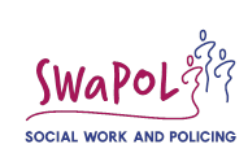The 5-day SWaPOL training is structured in three parts (modules)
Module 1: Cooperation between Social Work and Police
- Exchange of legal and ethical basics for professional practice
- Raise (self-)awareness about occupational cultures of social work and police work
- Learn about special working methods in social work and in policing
Module 1 focuses on general questions of collaboration between social work and police and critically reflects the “habitus” of the professions. The aim is to understand cultural differences, organisational structures, activities, attitudes, opinions, habits etc. Learning activities in the training support the collaboration in prevention work between crime prevention officers in the police and social workers. Working methods in social work and in community policing are discussed with regard to cooperation.
Module 2: Substance use among young people: Prevention and harm reduction in nightlife
- Learn about substances and classification, risk factors, harm reduction and prevention of drug addiction
- Consider different perspectives on nightlife activities (youth, social work, police)
- Improve collaboration between professions in the nightlife economy
In Module 2 participants shall learn about substance use disorders and discuss drug use in nightlife from different perspectives. Local prevalence and incidence rates will be presented, and a general framework of prevention will be introduced and discussed. Police officers and social workers examine the balance of prevention, harm reduction and social control on the basis of examples in European cities.
Module 3: Homelessness
- Explore the multidimensional processes of exclusion and marginalisation in public space
- Introduction to “Problem-oriented policing”: Case management, conflict resolution, care work
- Focus on risk factors: Housing, gentrification, displacement, mental illness
Module 3 aims to explore the multidimensional processes of exclusion and marginalisation in public space and introduces participants to social prevention strategies. The main focus is on risk factors for homelessness and social isolation including housing conditions, gentrification, displacement, alcohol and drug consumption, and mental illness. ‘Problem-oriented policing’ integrates case management, conflict resolution and care work in the community.
